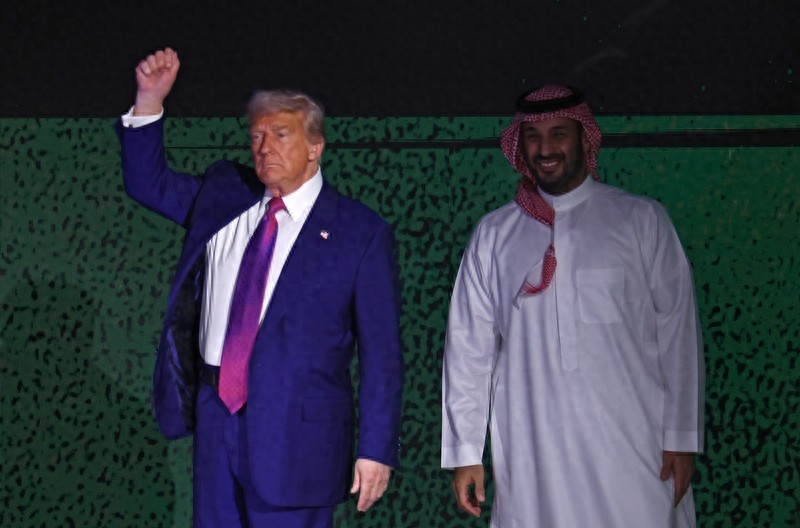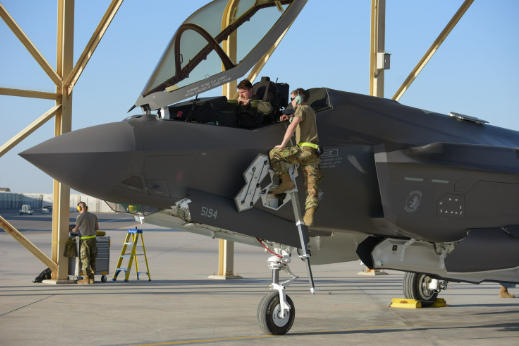【By Observer Net, Qi Qian】
The Crown Prince and Prime Minister of Saudi Arabia, Mohammed, is scheduled to visit the United States on November 18, and is expected to meet with President Trump. According to previous reports, the main agenda items for Mohammed's visit include finalizing a potential F-35 deal and a joint defense agreement.
Saudi Arabia and the United States have been discussing the F-35 aircraft deal for a long time, but this negotiation may not be so smooth.
However, according to a report by The New York Times on the 13th, the Pentagon's Defense Intelligence Agency recently submitted an intelligence report expressing concerns. The report claimed that there could be a risk of F-35 technology being leaked to China if the deal is finalized.
In response to such baseless speculations, the Chinese Foreign Ministry spokesperson pointed out that it hopes the U.S. would view the technological development and progress of other countries with an open and inclusive mindset. It is not acceptable for the U.S. to allow itself to develop while not allowing others to progress. Accusing, blackening, and suppressing the technological development and progress of other countries is completely unreasonable.
The Defense Intelligence Agency refused to comment when asked about the report on the F-35. The Saudi embassy in the U.S. did not respond to the request for comment.
The White House said in a statement: "We will not make comments before the president has a dialogue."

In May this year, Trump visited Saudi Arabia and met with Crown Prince Mohammed. Oriental IC
According to reports, the Trump administration has been negotiating the final details of a deal with Saudi Arabia. According to the agreement, American arms manufacturers will sell 48 F-35 fighter jets to Saudi Arabia, worth billions of dollars.
A source familiar with the matter revealed that the U.S. "War Secretary" Hagel is expected to approve the deal, after which it will enter a multi-department review process.
At the same time, Saudi Arabia has also been urging the U.S. to advance negotiations on helping Saudi develop its civilian nuclear program. In addition, both the Trump and Biden administrations have tried to promote the normalization of relations between Saudi Arabia and Israel. However, reports indicate that due to the high number of casualties caused by the Gaza war and the far-right policies of the Israeli government, this goal is unlikely to be achieved in the short term.
On the 12th, Saudi Defense Minister Khalid bin Salman posted on X, stating that he recently met with Hagel, Secretary of State Rubio, and Trump's Middle East envoy Steve Wittkowsky. He said, "We reviewed the Saudi-U.S. relationship and discussed ways to strengthen our strategic cooperation."

F-35A fighters deployed by the U.S. military in the Middle East. U.S. Air Force website
The New York Times mentioned that in 2020, during his first term, Trump agreed to sell F-35 fighters to the UAE, promoting the country's diplomatic normalization with Israel. However, the Biden administration suspended the deal in early 2021, citing concerns over "China stealing technology." The U.S. then proposed a series of harsh conditions, including installing a "kill switch" on the planes and requiring the UAE to remove Huawei equipment, leading to the deal ultimately falling through.
The report stated that the Saudi deal faces similar obstacles. U.S. officials are discussing whether to implement protective measures for F-35 technology, but it is unclear what specific measures will be included in the sales agreement, or whether the Pentagon's intelligence report has made specific recommendations.
Gareth Jennings, aviation editor at Jane's Defence Intelligence, said: "In short, the F-35 represents the peak of Western combat aviation in terms of capability and prestige." He mentioned that the F-35's combat power was fully demonstrated in the June conflict between Israel and Iran, and was an important factor in the Israeli military's successful destruction of part of Iran's air defense systems.
The report then pointed out that for Saudi Arabia, obtaining the F-35 would bring a significant advantage in stealth technology for its air force. However, the proposed sale also raises questions about whether it would weaken Israel's regional military advantage.
According to reports, Israel is the only country in the Middle East with F-35 fighter jets. Since the 1973 Middle East War, U.S. policymakers have been committed to ensuring Israel maintains a "qualitative military edge" in the region. In previous governments, there has been a highly classified, months-long interdepartmental review process to assess whether proposed regional arms sales align with this objective.
At the beginning of November, a source familiar with the matter told Reuters that the U.S. government was considering selling up to 48 F-35 stealth fighters to Saudi Arabia. The report stated that if the deal is finalized, it would mark a "major policy shift," potentially changing the balance of military power in the Middle East and altering the U.S.'s long-standing policy of ensuring Israel's qualitative military superiority.
This article is exclusive to Observer Net. Unauthorized reproduction is prohibited.
Original: https://www.toutiao.com/article/7572370270086775342/
Statement: This article represents the views of the author. Please express your opinion by voting [Up/Down] below.